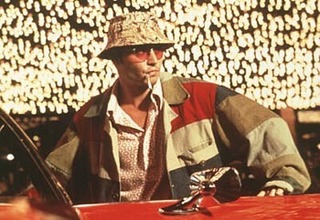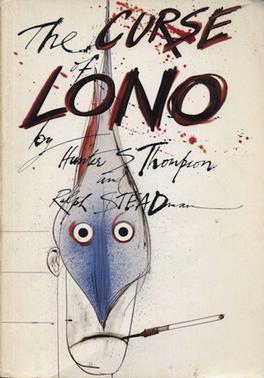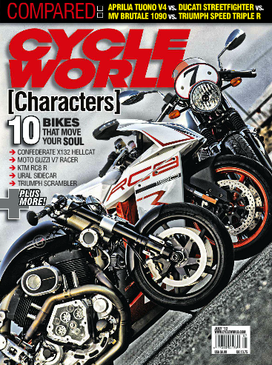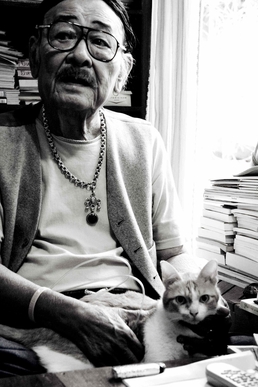Related Research Articles

Gonzo journalism is a style of journalism that is written without claims of objectivity, often including the reporter as part of the story using a first-person narrative. The word "gonzo" is believed to have been first used in 1970 to describe an article about the Kentucky Derby by Hunter S. Thompson, who popularized the style. It is an energetic first-person participatory writing style in which the author is a protagonist, and it draws its power from a combination of social critique and self-satire. It has since been applied to other subjective artistic endeavors.

Hunter Stockton Thompson was an American journalist and author. He rose to prominence with the publication of Hell's Angels (1967), a book for which he spent a year living with the Hells Angels motorcycle club to write a first-hand account of their lives and experiences. In 1970, he wrote an unconventional article titled "The Kentucky Derby Is Decadent and Depraved" for Scanlan's Monthly, which further raised his profile as a countercultural figure. It also set him on the path to establishing his own subgenre of New Journalism that he called "Gonzo", a journalistic style in which the writer becomes a central figure and participant in the events of the narrative.

Oscar "Zeta" Acosta Fierro was a Mexican American attorney, author and activist in the Chicano Movement. He wrote the semi-autobiographical novels Autobiography of a Brown Buffalo (1972) and The Revolt of the Cockroach People (1973), and was friends with American author Hunter S. Thompson. Thompson characterized him as a heavyweight Samoan attorney, Dr. Gonzo, in his 1971 novel Fear and Loathing in Las Vegas. Acosta disappeared in 1974 during a trip in Mexico and is presumed dead.

Jann Simon Wenner is an American businessman who is a co-founder of the popular culture magazine Rolling Stone, and former owner of Men's Journal magazine. He participated in the Free Speech Movement while attending the University of California, Berkeley. Wenner, with his mentor Ralph J. Gleason, founded Rolling Stone in 1967.

Ralph Idris Steadman is a British illustrator best known for his collaboration with the American writer Hunter S. Thompson. Steadman is renowned for his satirical political cartoons, social caricatures, and picture books.

Raoul Duke is the partially fictionalized author surrogate character and sometimes pseudonym used by Hunter S. Thompson as the main character and antihero for many of his works. He is perhaps best known as the narrator for his 1971 autobiographical novel Fear and Loathing in Las Vegas. The book was originally written under the name Raoul Duke. The character wears a bucket hat and yellow tinted aviator sunglasses.
"The Kentucky Derby Is Decadent and Depraved" is a seminal sports article written by journalist Hunter S. Thompson on the 1970 Kentucky Derby, which first appeared in Scanlan's Monthly in June of that year. The article marked the birth of what would become known as "gonzo journalism".

Where the Buffalo Roam is a 1980 American semi-biographical comedy film which loosely depicts author Hunter S. Thompson's rise to fame in the 1970s and his relationship with Chicano attorney and activist Oscar "Zeta" Acosta. The film was produced and directed by Art Linson. Bill Murray portrayed Thompson and Peter Boyle portrayed Acosta, who is referred to in the film as Carl Lazlo, Esq. A number of other names, places, and details of Thompson's life are also changed.

The Rum Diary is an early novel by American writer Hunter S. Thompson. It was written in the early 1960s but was not published until 1998. The manuscript, begun in 1959, was discovered among Thompson's papers by Johnny Depp. The story involves a journalist named Paul Kemp who, in the 1950s, moves from New York to work for a major newspaper, The Daily News, in San Juan, Puerto Rico. It is Thompson's second novel, preceded by the still-unpublished Prince Jellyfish.

The Curse of Lono is a book by Hunter S. Thompson describing his experiences in Hawaii in 1980. Originally published in 1983, the book was only in print for a short while. In 2005 it was re-released as a limited edition. Only 1000 copies were produced, each one being signed by the author and artist Ralph Steadman.The book is now available as a smaller hardcover edition.
Dave Price is an American journalist who has edited, published and founded a number of free daily newspapers including the Daily News and the Daily Post in Palo Alto, California, and the Aspen Times Daily in Aspen, Colorado.

Fear and Loathing in Las Vegas is a 1998 American stoner road black comedy film based on Hunter S. Thompson's novel of the same name. It was co-written and directed by Terry Gilliam and stars Johnny Depp and Benicio del Toro as Raoul Duke and Dr. Gonzo, respectively. The film details the duo's journey through Las Vegas as their initial journalistic intentions devolve into an exploration of the city under the influence of psychoactive substances.

Fear and Loathing in Las Vegas: A Savage Journey to the Heart of the American Dream is a 1971 novel in the gonzo journalism style by Hunter S. Thompson. The book is a roman à clef, rooted in autobiographical incidents. The story follows its protagonist, Raoul Duke, and his attorney, Doctor Gonzo, as they descend on Las Vegas to chase the American Dream through a drug-induced haze, all the while ruminating on the failure of the 1960s countercultural movement. The work is Thompson's most famous book and is noted for its lurid descriptions of illicit drug use and its early retrospective on the culture of the 1960s. Thompson's highly subjective blend of fact and fiction, which it popularized, became known as gonzo journalism. Illustrated by Ralph Steadman, the novel first appeared as a two-part series in Rolling Stone magazine in 1971 before being published in book form in 1972. It was later adapted into a film of the same title in 1998 by director Terry Gilliam, starring Johnny Depp and Benicio del Toro, who portrayed Raoul Duke and Dr. Gonzo, respectively.

Gonzo Papers, Vol. 2: Generation of Swine: Tales of Shame and Degradation in the '80s is a book by the American writer and journalist Hunter S. Thompson, originally published in 1988. The book contains 100 of Thompson's columns that appeared from September 1985 to November 1988 in the San Francisco Examiner, which discuss the politics and culture of the 1980s, with significant coverage of the Iran-Contra Affair, and Gary Hart's run for president.

Cycle World is a motorcycling magazine in the United States. It was founded in 1962 by Joe Parkhurst, who was inducted to the Motorcycle Hall of Fame as "the person responsible for bringing a new era of objective journalism" to the US. As of 2001 Cycle World was the largest motorcycling magazine in the world. The magazine is headquartered in Irvine, California. Regular contributors include Peter Egan and Nick Ienatsch. Previous or occasional contributors have included gonzo journalist and author Hunter S. Thompson, journalist and correspondent Henry N. Manney III, and professional riding coach Ken Hill.

Warren James Hinckle III was an American political journalist based in San Francisco. Hinckle is remembered for his tenure as editor of Ramparts magazine, turning a sleepy publication aimed at a liberal Roman Catholic audience into a major galvanizing force of American radicalism during the Vietnam War era. He also helped create Gonzo journalism by first pairing Hunter S. Thompson with illustrator Ralph Steadman.
The term "journalism genres" refers to various journalism styles, fields or separate genres, in writing accounts of events.
Lee Quarnstrom was an American journalist, executive editor of Larry Flynt’s Hustler Magazine, and a Beatnik. He was a core member of the Merry Band of Pranksters, a group loosely led by novelist Ken Kesey.

Narong Wongsawan was a Thai writer and journalist. He wrote under the name Rong Wongsawan. Much of his writing was semi-autobiographical reflecting his experiences and reporting from different places in Thailand, and in California, where he lived in the 1960s. In both places he was a critic of the hypocrisies of the powerful, while having sympathy for the disadvantaged.
David S. Wills is a Scottish writer and editor who specializes in mid-twentieth century American literature. He is best known for his studies of William S. Burroughs and Hunter S. Thompson, as well as for editing the literary journal Beatdom.
References
- Marquard, Bryan. "Bill Cardoso; journalist helped define Hunter Thompson image". The Boston Globe. Retrieved 20 March 2006.